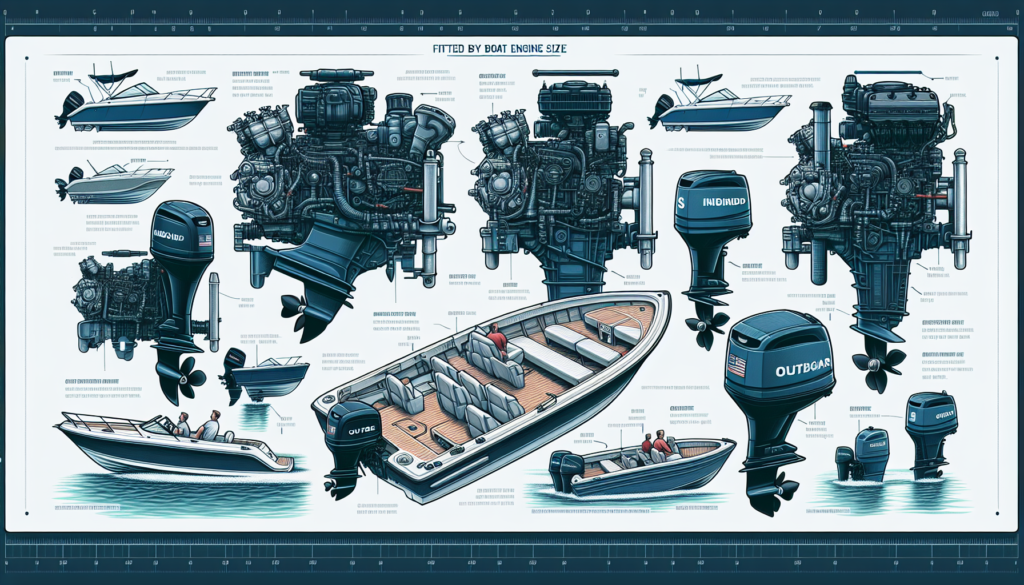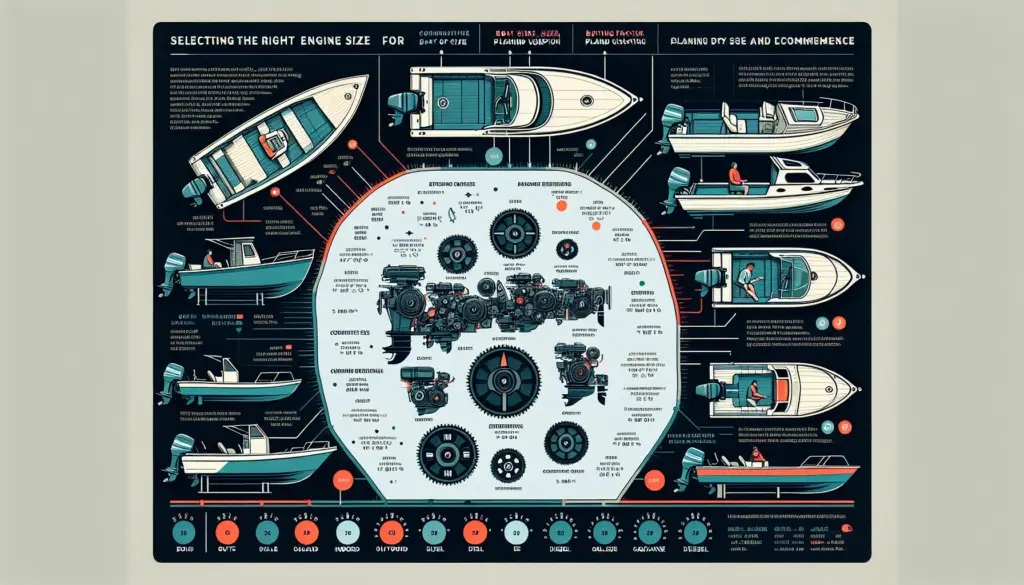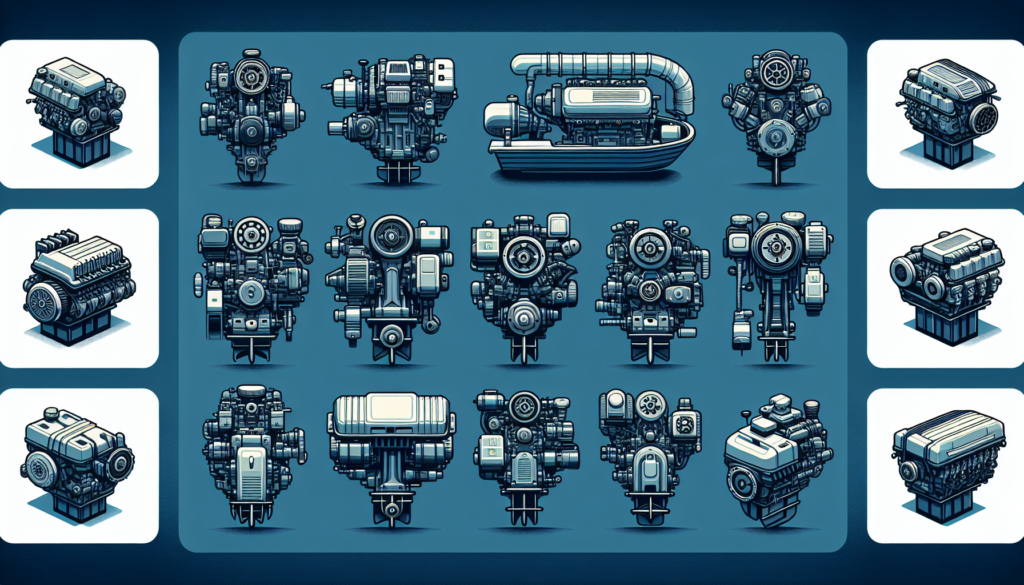You’re finally making your dream a reality – buying that boat you’ve always wanted. But before you set sail, there’s one critical decision you need to make – selecting the right engine size. In the “Guide To Choosing The Right Boat Engine Size,” you will find valuable information and expert advice on this crucial aspect of boating. This guide will provide essential tips and factors to consider, including the boat’s size, the intended use, fuel efficiency, and cost considerations. So, get ready to navigate through an ocean of knowledge to make your boating experience smooth sailing.
Understanding the Basics of Boat Engines
Before diving into the details of boat engine sizes, it’s crucial that you understand the basics. Boat engines might seem complex, but having a basic understanding will make selecting the right one much easier.
The Role of a Boat Engine
A boat engine is the heart and power source of your boat. Its primary function is to generate propulsion that moves the boat through the water. Be it to power your leisure cruise, your rigorous fishing expedition, or the intense speed races, the engine plays a pivotal role in the performance and functionality of your boat.
Key Components of a Boat Engine
While boat engines come in many types and sizes, there are key components that all boat engines have in common. They essentially comprise of a propulsion system, including the engine which generates the power, a drivetrain which transmits this power to the propeller, and the propeller itself which pushes the game water, propelling the boat forward.
How Boat Engines Work
In simple terms, boat engines work using a combination of fuel, air, and spark. Typically, fuel is mixed with air and ignited by a spark to create a mini explosion in the engine’s combustion chambers. This explosion forces the pistons to move, which in turn drives the propeller, pushing the boat forward.
Types of Boat Engines
When it comes to types, boat engines fall into two categories: inboard and outboard engines. Inboard engines are built into the boat, providing power from inside the hull, while outboard engines attach to the outside of the boat. Each type has advantages and, based on the intended use of the boat, one might be more suitable than the other.
Factors to Consider When Choosing a Boat Engine Size
Now that you understand the basics, let’s look at some key factors that you need to consider when choosing the right boat engine size.
The Size of Your Boat
The size of your boat is likely the most significant factor in choosing an engine. For instance, small engines are unlikely to be sufficient for large boats due to the lack of power. In contrast, one wouldn’t put a jumbo engine on a small boat, as it could cause over-powering and instability.
The Weight of Your Boat
Similarly, the weight of your boat also impacts the engine size. A heavier boat needs a more powerful engine for optimum performance, while a lighter boat can function well with a smaller engine.
Purpose of the Boat
The intended use of your boat is another crucial consideration. If you plan to use your boat for leisurely activities or fishing, a small-to-medium engine might suffice. However, if high-speed or racing is your goal, a more powerful engine will be needed.
Environmental Considerations
Environmental considerations are important too. Some engines are more fuel-efficient and environmentally friendly than others. Therefore, if you’re trying to minimize your carbon footprint, choose a boat engine that’s kind to Mother Nature.

Decoding Boat Engine Terms
While selecting a boat engine, you may come across some technical jargon like horsepower, engine displacement, torque, and engine rotation. Understanding these terms can significantly aid your decision-making process.
Horsepower Explained
Horsepower refers to the power that an engine produces. Simply put, the more horsepower an engine has, the more powerful it is. This means it can move heavier loads and reach higher speeds. However, more horsepower also typically means more fuel consumption.
Understanding Engine Displacement
Engine displacement is the total volume of all the cylinders in an engine. Larger displacement generally translates to more power, but also more fuel consumption.
What is Torque?
Torque is the rotational force generated by a boat engine. A higher torque means that the engine can turn the propeller with more force, providing a better acceleration which is crucial especially in rough waters.
Significance of Engine Rotation
Engine rotation is referred to as the direction in which the engine turns the propeller. This can either be standard (right-hand) rotation or counter (left-hand) rotation. This is crucial to balance the boat and minimize the leaning caused by propeller torque.
Overview of Common Boat Engine Sizes
Engine sizes are often categorized into small, medium, large, and jumbo. Understanding this classification can help steer you in the right direction when seeking the ideal engine for your boat.
Small Engines
Small boat engines typically range up to 10 horsepower. They’re suitable for use on little boats like small fishing boats, sailboats, and inflatable boats. These engines are often portable and simple to install and use.
Medium Engines
Midsize boat engines fall in the range of 10 to 50 horsepower. They are ideal for medium-sized boats used for leisure activities, fishing, and short-range cruising.
Large Engines
Large boat engines typically provide between 50 and 250 horsepower. These engines can power a boat at high speeds and are suitable for activities like water sports, long-range cruising, and offshore fishing.
Jumbo Engines
Lastly, jumbo engines are those that measure above 250 horsepower. These engines are designed for large boats and heavy-duty uses like commercial fishing, shipping, or heavy transportation.

Assessing Your Boating Needs
Identifying your exact boating requirements is pivotal when choosing the right engine size.
Leisure Boating Requirements
If you’re planning to use your boat for leisure activities such as family outings or relaxing on calm waters, smaller engines up to 50 horsepower would mostly suffice.
Fishing Boat Needs
For fishing, the engine size largely depends on the kind of fishing you plan to do. Inshore fishing can usually be accomplished with midsize engines, while offshore fishing requires larger, more powerful engines.
Speed and Performance Boating
If you’re into water sports or speedboat racing, you’ll be needing a high-performance engine. Large to jumbo engines with higher horsepower are more appropriate for these kinds of activities.
Boating in Different Waters
Lastly, your boating environment also matters a lot. For example, calm lakes and rivers may not require as much power as boating in open seas, which often experience rougher waters.
The Relationship between Engine Size and Fuel Efficiency
When discussing boat engine size, it’s impossible to ignore the topic of fuel efficiency. This matters primarily because it has both cost and environmental implications.
How Engine Size Affects Fuel Consumption
Generally speaking, bigger engines consume more fuel. This means the higher the horsepower, the more gas you’ll need, and thus, the higher your ongoing operating costs would be.
Choosing the Most Fuel-Efficient Engine Size
Striking a balance between power and efficiency can be tricky. The most fuel-efficient engine size is one that can adequately meet your power and performance needs while consuming as little fuel as possible.
Understanding Fuel-to-Weight Ratios
Another important concept is the fuel-to-weight ratio. Smaller engines may consume less fuel, but they might also need to work harder (i.e., burn more fuel) to move heavy loads compared to bigger engines.

Maintenance Considerations for Different Engine Sizes
Different engine sizes come with different maintenance needs, which also need to be factored into your decision.
Regular Maintenance Needs
All boat engines need regular maintenance, but the needs can vary. Generally, larger engines are more complex and may require more frequent maintenance than their smaller counterparts.
Cost of Maintenance
Alongside the regular maintenance needs, the maintenance costs of different engine sizes also vary. Larger, more complex engines typically cost more to maintain, which can significantly impact your overall boating budget in the long run.
Availability of Parts and Services
Lastly, consider the availability of parts and services for different engine sizes. In some cases, parts for smaller or older engines may be harder to find, which can cause delays and inconvenience when maintenance or repairs are due.
Pros and Cons of Different Engine Sizes
Like everything, different engine sizes have their own sets of pros and cons. Understanding these can help you make a more informed decision.
Advantages of Small Engines
Small engines are generally more fuel-efficient, easier to maintain, and more cost-effective. They are ideal for leisure activities and can be sufficient for small to medium-sized boats.
Drawbacks of Small Engines
However, small engines may lack the power required for larger boats or heavier loads. They may also fall short when it comes to speed and performance, especially for activities that require high speed or power.
Benefits of Large Engines
Large engines, on the other hand, offer more power and speed. They can handle larger boats and heavier loads efficiently and are ideal for activities like racing or offshore fishing.
Disadvantages of Large Engines
The downside to large engines is their high fuel consumption and potentially bigger impact on the environment. They are also more complex, often resulting in higher maintenance demands and costs.

Seeking Professional Advice for Engine Size Selection
Even with all this knowledge, choosing the right engine size for your boat can still be daunting. Hence, seeking advice from a boating expert can be hugely beneficial.
Role of a Boating Expert
A boating expert can assess your unique needs, consider various aspects like the boat size, weight, purpose, and your budget, and provide a tailored recommendation. Their knowledge and experience can save you from mistakes and help you make the most appropriate choice.
Where to Find Credible Advice
You can find reliable boating experts in boat dealerships, boat shows, or boating clubs. Also, online forums and communities dedicated to boating can provide valuable insights and recommendations.
Decoding Technical Jargon
While interacting with boating experts, you may be exposed to some technical jargon. Don’t shy away from asking questions. Their job is to clarify these terms and concepts to help you make the best decision.
Making the Final Decision
With all the knowledge and expert advice, you’re now ready to make your final decision. But there are still a few more factors that you should consider.
Budget Considerations
Your budget will have a significant influence on your decision. Remember that this cost is not only for the initial purchase but also includes ongoing fuel and maintenance costs.
Prioritising Needs over Wants
It’s essential to prioritize your needs over your wants. While a larger and more powerful engine might be tempting, it may not necessarily be the best fit for your needs and could lead to higher expenses in the long run.
Considering Long-term Value
Finally, consider the long-term value of your investment. A more expensive, fuel-efficient engine may cost more upfront but could save you money in the long run. Similarly, an engine that is easier to maintain may also provide better value over time.
In conclusion, choosing the right boat engine size is about understanding the basics, considering your needs and environmental factors, and making informed decisions. It’s a combination of technical knowledge, personal preferences, and professional advice. But with careful thought and consideration, you’re sure to find the perfect engine for your boating needs.

